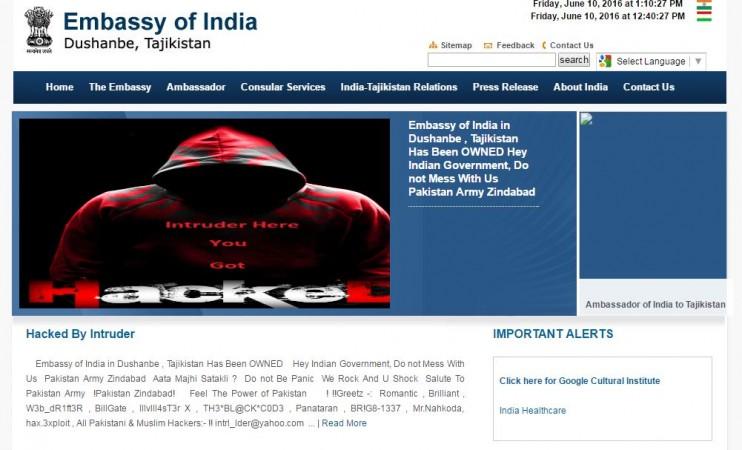
Websites of the Indian embassy in up to seven countries were vandalised by pro-Pakistani hackers "Intruder" and "Romantic." The home page of the hacked websites was defaced with pro-Pakistani messages warning India. However, currently all the websites are up and running, except that of the Indian embassy of Tajikistan.
The websites had an image of a person in red and black hooded jacket, with a warning message: "Intruder Here. You got hacked," reported the New Indian Express.
The websites of the following embassies were affected:
- Indian embassy in Dushanbe, Tajikistan
- Indian embassy in Bucharest, Romania
- Indian embassy in Athens, Greece
- Indian embassy in Ankara, Turkey
- Indian embassy in Mexico City, Mexico
- Consulate General of India in Sao Paolo
- High Commission of India in Pretoria
Apart from the Indian embassy in Dushanbe in Tajikistan, the rest of the affected websites belonging to the Ministry of External Affairs are back and running. Currently, message on the website belonging to the Indian embassy of Tajikistan reads: "Account Suspended."
The hackers also left a message on the front page of the website that read:
"Hey Indian Government, Don't Mess With Us
Pakistan Army Zindabad
Aata Majhi Satakli ?
Don't Be Panic
We Rock And U Shock
Salute To Pakistan Army !
Pakistan Zindabad!
Feel The Power of Pakistan ! !!
Greetz -: R"
The report also noted how an Indian hacking group, Indian Black Hats, had responded to a similar attack by a Pakistani hacker, Faisal 1137 aka Faisal Afzal, who defaced Indian Railways website in May 2016.
It would take three to four hours for administrators to get back to the original website, but some might take longer, according to a quote offered by an Indian hacker.
The Indian Computer Emergency Response Team (CERT-In) is the nodal agency under the Ministry of Communications and Information Technology that is tasked to deal with cyber security threats like hacking and phishing. Last year, CERT-In's annual report noted that over 26,244 websites in India (18,403 websites with the .in domain) were defaced by hackers.
Previously, in 2013, the nodal agency had issued a list of security guidelines that all the critical departments of the government of India had to follow. These measures included installing strong firewall, anti-spyware and anti-phishing controls, regular updatation of the all application softwares, usage of latest internet browsers and exercising caution while opening unsolicited emails, the Hindu reported.
It is interesting to find that during the 2013 analysis by CERT-In, it found that "Romantic" and "Intruder" had figured in the list of top cyberattackers against India.





!['It's not Mumbai traffic, it's air traffic': Suriya apologises to Mumbai media after paparazzi yelled At Him for making them wait for hours [Watch]](https://data1.ibtimes.co.in/en/full/806234/its-not-mumbai-traffic-its-air-traffic-suriya-apologises-mumbai-media-after-paparazzi.jpg?w=220&h=138)
![Bigg Boss 16-fame Sreejita De and Michael Blohm-Pape exchange wedding vows in dreamy Bengali ceremony [Inside Pics]](https://data1.ibtimes.co.in/en/full/806233/bigg-boss-16-fame-sreejita-de-michael-blohm-pape-exchange-wedding-vows-dreamy-bengali-ceremony.jpg?w=220&h=138)






